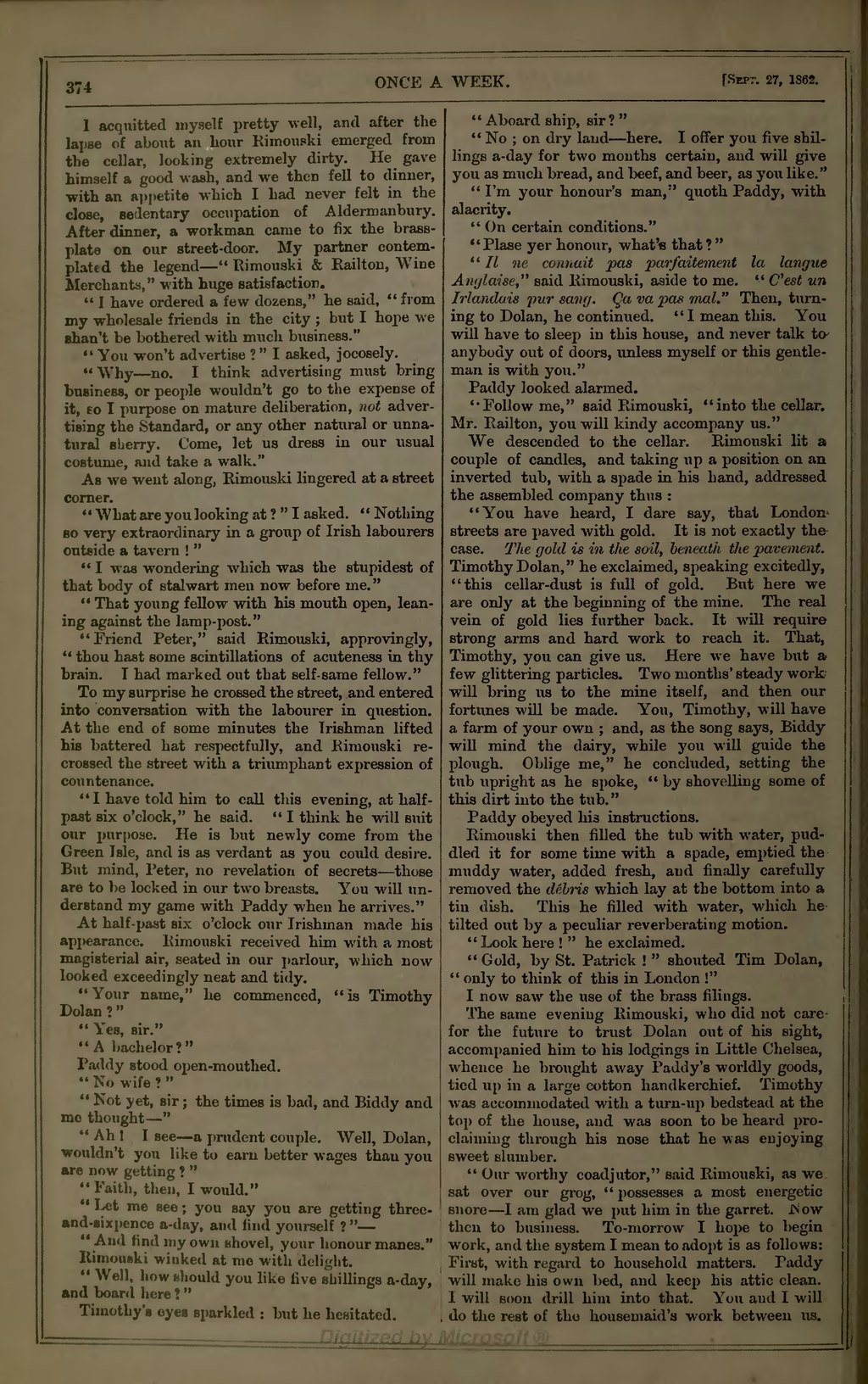I acquitted myself pretty well, and after the lapse of about an hour Rimouski emerged from the cellar, looking extremely dirty. He gave himself a good wash, and we then fell to dinner, with an appetite which I had never felt in the close, sedentary occupation of Aldermanbury. After dinner, a workman came to fix the brass-plate on our street-door. My partner contemplated the legend—“Rimouski & Railton, Wine Merchants,” with huge satisfaction.
“I have ordered a few dozens,” he said, “from my wholesale friends in the city; but I hope we shan’t be bothered with much business.”
“You won’t advertise?” I asked, jocosely.
“Why—no. I think advertising must bring business, or people wouldn’t go to the expense of it, so I purpose on mature deliberation, not advertising the Standard, or any other natural or unnatural sherry. Come, let us dress in our usual costume, and take a walk.”
As we went along, Rimouski lingered at a street corner.
“What are you looking at?” I asked. “Nothing so very extraordinary in a group of Irish labourers outside a tavern!”
“I was wondering which was the stupidest of that body of stalwart men now before me.”
“That young fellow with his mouth open, leaning against the lamp-post.”
“Friend Peter,” said Rimouski, approvingly, “thou hast some scintillations of acuteness in thy brain. I had marked out that self-same fellow.”
To my surprise he crossed the street, and entered into conversation with the labourer in question. At the end of some minutes the Irishman lifted his battered hat respectfully, and Rimouski recrossed the street with a triumphant expression of countenance.
“I have told him to call this evening, at half-past six o’clock,” he said. “I think he will suit our purpose. He is but newly come from the Green Isle, and is as verdant as you could desire. But mind, Peter, no revelation of secrets—those are to be locked in our two breasts. You will understand my game with Paddy when he arrives.”
At half-past six o’clock our Irishman made his appearance. Rimouski received him with a most magisterial air, seated in our parlour, which now looked exceedingly neat and tidy.
“Your name,” he commenced, “is Timothy Dolan?”
“Yes, sir.”
“A bachelor?”
Paddy stood open-mouthed.
“No wife?”
“Not yet, sir; the times is bad, and Biddy and me thought—”
“Ah! I see—a prudent couple. Well, Dolan, wouldn’t you like to earn better wages than you are now getting?”
“Faith, then, I would.”
“Let me see; you say you are getting three-and-sixpence a-day, and find yourself?”—
“And find my own shovel, your honour manes.”
Rimouski winked at me with delight.
“Well, how should you like five shillings a-day, and board here?”
Timothy’s eyes sparkled: but he hesitated.
“Aboard ship, sir?”
“No; on dry land—here. I offer you five shillings a-day for two months certain, and will give you as much bread, and beef, and beer, as you like.”
“I’m your honour’s man,” quoth Paddy, with alacrity.
“On certain conditions.”
“Plase yer honour, what’s that?”
“Il ne connait pas parfaitement la langue Anglaise,” said Rimouski, aside to me. “C’est un Irlandais pur sang. Ça va pas mal.” Then, turning to Dolan, he continued. “I mean this. You will have to sleep in this house, and never talk to anybody out of doors, unless myself or this gentleman is with you.”
Paddy looked alarmed.
“Follow me,” said Rimouski, “into the cellar. Mr. Railton, you will kindy accompany us.”
We descended to the cellar. Rimouski lit a couple of candles, and taking up a position on an inverted tub, with a spade in his hand, addressed the assembled company thus:
“You have heard, I dare say, that London streets are paved with gold. It is not exactly the case. The gold is in the soil, beneath the pavement. Timothy Dolan,” he exclaimed, speaking excitedly, “this cellar-dust is full of gold. But here we are only at the beginning of the mine. The real vein of gold lies further back. It will require strong arms and hard work to reach it. That, Timothy, you can give us. Here we have but a few glittering particles. Two months’ steady work will bring us to the mine itself, and then our fortunes will be made. You, Timothy, will have a farm of your own; and, as the song says, Biddy will mind the dairy, while you will guide the plough. Oblige me,” he concluded, setting the tub upright as he spoke, “by shovelling some of this dirt into the tub.”
Paddy obeyed his instructions.
Rimouski then filled the tub with water, puddled it for some time with a spade, emptied the muddy water, added fresh, and finally carefully removed the debris which lay at the bottom into a tin dish. This he filled with water, which he tilted out by a peculiar reverberating motion.
“Look here!” he exclaimed.
“Gold, by St. Patrick!” shouted Tim Dolan, “only to think of this in London!”
I now saw the use of the brass filings.
The same evening Rimouski, who did not care for the future to trust Dolan out of his sight, accompanied him to his lodgings in Little Chelsea, whence he brought away Paddy’s worldly goods, tied up in a large cotton handkerchief. Timothy was accommodated with a turn-up bedstead at the top of the house, and was soon to be heard proclaiming through his nose that he was enjoying sweet slumber.
“Our worthy coadjutor,” said Rimouski, as we sat over our grog, “possesses a most energetic snore—I am glad we put him in the garret. Now then to business. To-morrow I hope to begin work, and the system I mean to adopt is as follows: First, with regard to household matters. Paddy will make his own bed, and keep his attic clean. I will soon drill him into that. You and I will do the rest of the housemaid’s work between us.